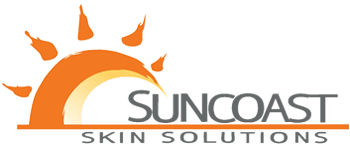Correctly identifying the cause for the athlete’s foot is the most reliable way to diagnose the dermatology condition. It is relatively simple to diagnose and treat fungal athlete’s foot.
Visualizing the fungus within the skin scrapings removed from the impact sites of the feet is a cost-effective and painless way to diagnose the condition.
In rare cases, it is essential to identify fungi in parts of the skin removed during a biopsy. If fungus is not detected, other reasons for the development of athlete’s foot must be investigated.
Suncoast Skin Solutions, led by board certified dermatologist Dr. Christopher Ewanowski, provides cutting-edge skin care treatments to patients in Tampa, Brandon, Lutz, Seminole, Riverview, Brooksville, Winter Haven, Daytona Beach, Largo, St. Petersburg, Ocala, Sarasota, Palm Harbor, Central Florida, Florida, and surrounding locations.
What does the treatment for athlete’s foot involve?
As there is no single reason for the occurrence of athlete’s foot, there is no single treatment for it. Regardless, all the causes for the development of this condition benefit from promoting a hygienic, dry, and friction-free environment for the feet.
Shoes made out of occlusive shoe materials, such as vinyl, cause the feet to remain moist, creating a fertile breeding ground for fungus. Similarly, absorbent socks, such as cotton, that wick water away from the feet may be helpful.
Some people who sweat profusely benefit from the use of antiperspirants such as 20 percent aluminum chloride (Drysol). Powders can also help the feet remain dry.
While it may sound counterintuitive, soaking the feet in a solution of aluminum acetate (Burow’s solution or Domeboro solution) and then air drying with a fan can be very helpful if done three to four times within 30 minutes.
A home remedy of diluted white vinegar soaks, using one part vinegar and approximately four parts water, once or twice daily (as ten-minute foot soaks) followed by evaporation can be a helpful treatment.
Medications
There are plenty of options for fungal infections. Many drugs are available such as econazole, miconazole, terbinafine (Lamisil), econazole, butenafine, naftifine, ketoconazole, ciclopirox, sulconazole, tolnaftate, sertaconazole, and luliconazole.
It is hard to determine which of these medications is most effective as they have not been tested against each other.
Cost is likely the most important differentiating factor, and many of these drugs are available without a prescription. The treatment for athlete’s foot should usually be continued for four weeks or at least one week after all the symptoms have resolved.
A course of an oral (pill) antifungal such as itraconazole (Sporanox), terbinafine (Lamisil), or fluconazole (Diflucan) may be necessary for more resistant or advanced cases of athlete’s foot. The patient may require lab blood tests to ensure that there is no liver disease before taking these pills.
Topical corticosteroid creams suppress the body’s immune system and can act as a “fertilizer” for fungus. This may actually worsen fungal skin infections.
These topical steroid drugs do not have any role in treating fungal foot infections but can be very effective in the treatment of non-infectious causes of athlete’s foot.
In case the fungal infection has spread to the toenails, the nails should also be treated to avoid repetitive infections. In general, nails often initially remain untreated only to find that the athlete’s foot keeps recurring.
It is vital to treat all noticeable fungus at the same time. The effective treatment of nail fungus may be more intensive and require extended courses (three to four months) of oral antifungal drugs.
Dr. Ewanowski’s dermatology practice and medical spa receives patients from Tampa, Brandon, Lutz, Seminole, Riverview, Brooksville, Winter Haven, Daytona Beach, Largo, St. Petersburg, Ocala, Sarasota, Palm Harbor, Central Florida, Florida, and nearby areas for safe and proven skin care procedures.
SunCoast Skin Solutions Dermatology offices are located in Tampa / Hillsborough, St. Petersburg / Pinellas County, Brandon, Lutz (2 locations), Winter Haven, Largo, Riverview, Brooksville, Ocala, Largo at Bardmoor, Daytona Beach, Sarasota, and Palm Harbor, Florida. Contact us at 1-844-786-3376 or click here.

Recent Comments